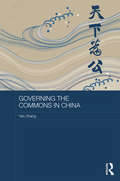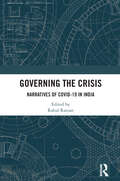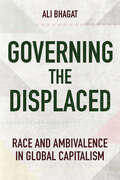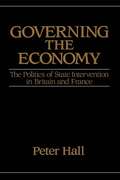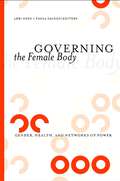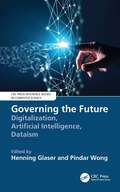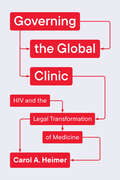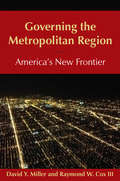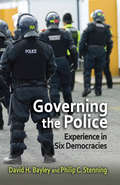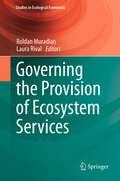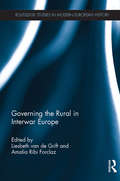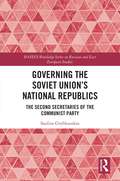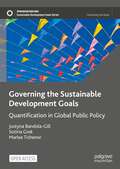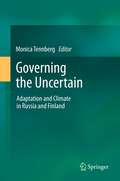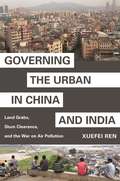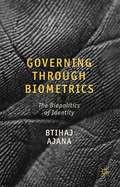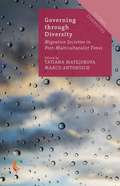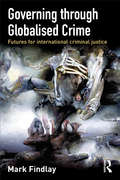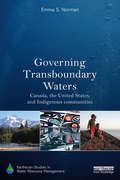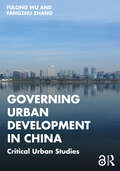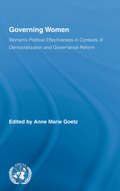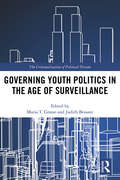- Table View
- List View
Governing the Commons in China (Routledge Studies on the Chinese Economy)
by Yan ZhangThe idea of 'the commons' is a long-standing concept in the English-speaking world and in English law. A similar concept occurs in China. How different from or similar to the English idea of ‘the commons’ is the idea in China; and how is the concept applied? This book explores this important subject. It examines the subject from a philosophical and theoretical perspective; considers ‘the commons’ widely, including tangible commons of resources, intangible commons of culture, identity and social capital, and institutional commons of welfare, security and public goods; and goes on to examine the concept as it applies to the hydropower developments along the Lancang River, outlining the different competing interests of local people, central and provincial government, and environmental considerations. It argues that the concept of ‘the commons’ in China is dual-dimensional, with a vertical dimension of ‘public authority’ and a horizontal dimension of ‘commonly sharing’, that power structures in China have often been flexible and polycentric, and that, correctly applied, this approach will do much to serve the common interest of the people, ensuring positive impacts for shared prosperity for multiple stakeholders, whilst mitigating the negative impacts involved in the delivery of such positive impacts.
Governing the Crisis: Narratives of Covid-19 in India
by Rahul RanjanThis book presents a multidimensional approach to understanding the effects of COVID-19 on the lifeworld of the marginalised communities in India. The essays in the volume pursue two interrelated concerns: First, they examine the governance aspect, highlighting institutional failures, a lack of political will, and ideological warfare; second, they firmly position the crisis – as a narrative tool – at the heart of marginality, thereby explaining the effects of COVID-19 on communities that continue to remain at the nation's margins. The volume presents varied voices and granular narratives of sufferings that structured the lives of the poorest and dispossessed in the country during the crisis. It dovetails the reshaping of material forces that were crucially impacted by the failure of governance with the social lifeworld of those containing what can be referred to as intergenerational trauma. This volume offers a robust account of the crisis by combining these two distinct but complementary dimensions of COVID-19 in India.The volume will greatly interest scholars and researchers in crisis studies, governance, medical anthropology, public policy, politics, sociology, and South Asian studies.
Governing the Displaced: Race and Ambivalence in Global Capitalism
by Ali BhagatGoverning the Displaced answers a straightforward question: how are refugees governed under capitalism in this moment of heightened global displacement? To answer this question, Ali Bhagat takes a dual case study approach to explore three dimensions of refugee survival in Paris and Nairobi: shelter, work, and political belonging. Bhagat's book makes sense of a global refugee regime along the contradictory fault lines of passive humanitarianism, violent exclusion, and organized abandonment in the European Union and East Africa. Governing the Displaced highlights the interrelated and overlapping features of refugee governance and survival in these seemingly disparate places. In its intersectional engagement with theories of racial capitalism with respect to right-wing populism, labor politics, and the everyday forms of exclusion, the book is a timely and necessary contribution to the field of migration studies and to political economy.
Governing the Economy: The Politics of State Intervention in Britain and France (Europe And The International Order Ser.)
by Peter A. HallFor over one hundred years, the British economy has been in decline relative to other industrialized countries. <p><p>This book explores the origins of Britain's economic problems and develops a striking new argument about the sources of decline. It goes on to analyze the evolution of economic policy in postwar Britain from the development of Keynesianism to the rise of monetarism under Margaret Thatcher. France, by contrast, experienced an economic miracle in the postwar period. <p><p>Hall argues that the French state transformed itself and then its society through an extensive system of state intervention. In the recent period, however, the French system has encountered many difficulties, and the book locates their sources in the complex interaction between state and society in France culminating in the socialist experiment of Francois Mitterrand. <p><p>Through his insightful, comparative examination of policy-making in Britain and France, Hall develops a new approach to state-society relations that emphasizes the crucial role of institutional structures.
Governing the Female Body: Gender, Health, and Networks of Power
by Lori Reed Paula SaukkoDrawing on Foucault's notion of governmentality, this collection explores relations between the intimate governance of bodies and political governance. The contributors offer empirically grounded yet theoretically sophisticated case studies showing how gendered, racialized, and socioeconomic agendas structure medical and scientific practices. Developing and utilizing a poststructuralist feminist framework, the chapters investigate emerging gendered discourses and practices around health, such as breast cancer charities, lifestyle genetic testing, new reproductive technologies, and the development and marketing of various psychotropic and hormonal drugs. This will be a key reader for anyone interested in the social implications of cutting edge medical technologies.
Governing the Future: Digitalization, Artificial Intelligence, Dataism (CRC Press Reference Books in Computer Science)
by Henning Glaser Pindar WongWe are living in times of deep and disruptive change. Perhaps the most powerful vector of this change can be described by three related catchphrases: digitalization, artificial intelligence, and dataism. Drawing on considerable expertise from a wide range of scholars and practitioners, this interdisciplinary collection addresses the challenges, impacts, opportunities and regulation of this civilizational transformation from a variety of angles, including technology, philosophy, cultural studies, international law, sociology and economics. This book will be of special interest to scholars, students, analysts, policy planners, and decision-makers in think tanks, international organizations, and state agencies studying and dealing with the development and governance of disruptive technologies.
Governing the Global Clinic: HIV and the Legal Transformation of Medicine (Chicago Series in Law and Society)
by Carol A. HeimerA deep examination of how new, legalistic norms affected the trajectory of global HIV care and altered the practice of medicine. HIV emerged in the world at a time when medicine and healthcare were undergoing two major transformations: globalization and a turn toward legally inflected, rule-based ways of doing things. It accelerated both trends. While pestilence and disease are generally considered the domain of biological sciences and medicine, social arrangements—and law in particular—are also crucial. Drawing on years of research in HIV clinics in the United States, Thailand, South Africa, and Uganda, Governing the Global Clinic examines how growing norms of legalized accountability have altered the work of healthcare systems and how the effects of legalization vary across different national contexts. A key feature of legalism is universalistic language, but, in practice, rules are usually imported from richer countries (especially the United States) to poorer ones that have less adequate infrastructure and fewer resources with which to implement them. Challenging readers to reconsider the impulse to use law to organize and govern social life, Governing the Global Clinic poses difficult questions: When do rules solve problems, and when do they create new problems? When do rules become decoupled from ethics, and when do they lead to deeper moral commitments? When do rules reduce inequality? And when do they reflect, reproduce, and even amplify inequality?
Governing the Metropolitan Region: America's New Frontier
by David Y Miller Raymond CoxThis text is aimed at the basic local government management course (upper division or graduate) that addresses the structural, political and management issues associated with regional and metropolitan government. It also can complement more specialized courses such as urban planning, urban government, state and local politics, and intergovernmental relations.
Governing the Police: Experience in Six Democracies
by David BayleyEvery modern democracy in our increasingly complex world must confront a fundamental problem: how should politicians manage police, ensuring that they act in the public interest while avoiding the temptation to utilize them in a partisan manner? Drawing on first-hand experiences from six democracies, the authors describe how frequently disagreements arise between politicians and police commanders, what issues are involved, and how they are resolved.Governing the Police is organized into three parts: the intellectual and governmental context of democratic governance; the experience of chief officers in that relationship; and the reflections on lessons learned. Instead of describing practices within each individual country, it compares them across countries, developing generalizations about practices, explanations for differences, and assessments of success in managing the police/political relationship.Focusing mainly on the daily, informal interactions between politicians and police as they balance their respective duties, this book compares the experiences and opinions of chief police officers in Australia, Britain, Canada, India, New Zealand, and the United States. By examining the experiences of important officials, the authors explain how the balance between accountability and independence can be managed and what challenges leaders face. The authors conclude by posing well-informed recommendations for improving police governance.
Governing the Provision of Ecosystem Services
by Roldan Muradian Laura RivalFounded on the core notion that we have reached a turning point in the governance, and thus the conservation, of ecosystems and the environment, this edited volume features more than 20 original chapters, each informed by the paradigm shift in the sector over the last decade. Where once the emphasis was on strategies for conservation, enacted through instruments of control such as planning and 'polluter pays' legislation, more recent developments have shown a shift towards incentive-based arrangements aimed at those responsible for providing the environmental services enabled by such ecosystems. Encouraging shared responsibility for watershed management, developed in Costa Rica, is a prime example, and the various interests involved in its instauration in Java are one of the subjects examined here.
Governing the Rural in Interwar Europe (Routledge Studies in Modern European History)
by Liesbeth van de Grift Amalia Ribi ForclazThis book examines how rural Europe as a hybrid social and natural environment emerged as a key site of local, national and international governance in the interwar years. The post-war need to secure and intensify food production, to protect contested border areas, to improve rural infrastructure and the economic viability of rural regions and to politically integrate rural populations, gave rise to a variety of schemes aimed at modernizing agriculture and remaking rural society. The volume examines discourses, institutions and practices of rural governance from a transnational perspective, revealing striking commonalities across national and political boundaries. From the village town hall to the headquarters of international organizations, local authorities, government officials and politicians, scientific experts and farmers engaged in debates about the social, political and economic future of rural communities. They sought to respond to both real and imagined concerns over poverty and decline, backwardness and insufficient control, by conceptualizing planning and engineering models that would help foster an ideal rural community and develop an efficient agricultural sector. By examining some of these local, national and international schemes and policies, this volume highlights the hitherto under-researched interaction between policymakers, experts and rural inhabitants in the European countryside of the 1920s and '30s.
Governing the Soviet Union's National Republics: The Second Secretaries of the Communist Party (BASEES/Routledge Series on Russian and East European Studies)
by Saulius GrybkauskasSecond Secretary of the Central Committee of a Soviet republic does not sound a very important position, but as this book shows it was an extremely important role, one that helped hold the Soviet Union together and helped to keep it going for so long. The key was that Second Secretaries were both members of a Soviet republic’s ruling body and at the same time members of the All-Union ruling elite - they were often characterised as Moscow’s governor generals. This book examines how the position of Second Secretary was established by Khrushchev in the 1950s, explores how it took on increasingly important political functions representing Moscow’s interests in the republics and the republics’ interests in Moscow, and discusses how the conflicts, inherent in the role, developed. The book also provides biographical details of the people who held the position and argues that the role was extremely effective in managing what could otherwise have been very difficult relationships between centre and periphery.
Governing the Sustainable Development Goals: Quantification in Global Public Policy (Sustainable Development Goals Series)
by Justyna Bandola-Gill Sotiria Grek Marlee TichenorThis open access book conceptualises the Sustainable Development Goals as epistemic infrastructures that connect numbers, networks and governing paradigms.The book approaches quantification not merely as a tool for governing, but rather as a broader epistemic system through which global public policy is produced. This book focuses on the role of international organisations in shaping and implementing the 2030 Agenda and demonstrates how the SDGs have transformed and accelerated trends in quantification.
Governing the Uncertain
by Monica TennbergThe book provides a detailed analysis of the development of adaptive governance in Russia and Finland. It presents a case study from the Sakha Republic in Russia that focuses on community's participation in the process of governing of the flood events in the Tatta River area. Local adaptive practices are analyzed in relation to federal and regional responses that may mandate, encourage or collide with community's agency. A second case study is centered on the Finnish community of Kuttura, Ivalo. It explores the mounting challenges presented by changing environmental conditions to traditional reindeer herding, as well as the efforts made to cope with these new factors. Combining anthropological research and political science, this penetrating work offers revealing scrutiny of governmental responses to one of the most urgent issues facing both politicians and the citizens who live in their domains.
Governing the Urban in China and India: Land Grabs, Slum Clearance, and the War on Air Pollution (Princeton Studies in Contemporary China #10)
by Xuefei RenAn in-depth look at the distinctly different ways that China and India govern their cities and how this impacts their residentsUrbanization is rapidly overtaking China and India, the two most populous countries in the world. One-sixth of humanity now lives in either a Chinese or Indian city. This transformation has unleashed enormous pressures on land use, housing, and the environment. Despite the stakes, the workings of urban governance in China and India remain obscure and poorly understood.In this book, Xuefei Ren explores how China and India govern their cities and how their different styles of governance produce inequality and exclusion. Drawing upon historical-comparative analyses and extensive fieldwork (in Beijing, Guangzhou, Wukan, Delhi, Mumbai, and Kolkata), Ren investigates the ways that Chinese and Indian cities manage land acquisition, slum clearance, and air pollution. She discovers that the two countries address these issues through radically different approaches. In China, urban governance centers on territorial institutions, such as hukou and the cadre evaluation system. In India, urban governance centers on associational politics, encompassing contingent alliances formed among state actors, the private sector, and civil society groups. Ren traces the origins of territorial and associational forms of governance to late imperial China and precolonial India. She then shows how these forms have evolved to shape urban growth and residents’ struggles today.As the number of urban residents in China and India reaches beyond a billion, Governing the Urban in China and India makes clear that the development of cities in these two nations will have profound consequences well beyond their borders.
Governing through Biometrics
by Btihaj AjanaManaging identity through biometric technology has become a routine and ubiquitous practice in recent years. This book interrogates what is at stake in the merging of the body and technology for surveillance and securitization purposes drawing on a number of critical theories and philosophies.
Governing through Diversity: Migration Societies In Post-multiculturalist Times (Global Diversities)
by Marco Antonsich Tatiana MatejskovaThis cross-disciplinary edited collection presents an integrated approach to critical diversity studies by gathering original scholarly research on ideational, technical and actual social dimensions of contemporary governance through diversity.
Governing Through Globalised Crime: Futures for International Criminal Justice
by Mark J. FindlayGoverning through Globalised Crime provides an analysis of the impact of globalisation of crime on the governance capacity of the international criminal justice system. It explores how the perceived increased risk in global security has resulted in a reformulation of the relationship between crime and governance.The book seeks to argue that values of freedom, equality, communitarian harmony and personal integrity which the prosecution of crimes against humanity are said to advance, need not be sacrificed in a new world order obsessed with partial security and secularized risk. This book aims to address a way forward for the governance capacity of international criminal justice, arguing that international criminal justice provides a central tool for global governance. In exploring the dependency of global governance on crime and control, projections can be made about the changing face of international criminal justice. Fundamental transformation is required to hold unjust global dominion to account.The book's policy perspective challenges international criminal justice to return to the more critical position justice has exercised in the separation of powers constitutional legality. For liberal democratic theory at least, judicial authority and its institutions have ensured constitutional legality by requiring the legislature and the executive to operate accountably against a higher normative order. This is not a predominant function of judges and courts in the international context despite their statutory invocation to this task .Case-studies of global crime and control reveal contexts in which the co-opted governance of institutional ICJ in particular, has a politicized motivation which too often advances the authority and interests of one world order against the sometimes legitimate resistance of criminalized communities. When the analysis moves to the consideration of victim community interests, and from there to the appropriate global constituencies of ICJ, the nature and limitations of ICJ supporting governance in the risk/security model, becomes apparent.
Governing Transboundary Waters: Canada, the United States, and Indigenous Communities (Earthscan Studies in Water Resource Management)
by Emma S. NormanWinner of the Political Geography Specialty Group's 2015 Julian Minghi Distinguished Book Award! With almost the entire world’s water basins crossing political borders of some kind, understanding how to cooperate with one’s neighbor is of global relevance. For Indigenous communities, whose traditional homelands may predate and challenge the current borders, and whose relationship to water sources are linked to the protection of traditional lifeways (or ‘ways of life’), transboundary water governance is deeply political. This book explores the nuances of transboundary water governance through an in-depth examination of the Canada-US border, with an emphasis on the leadership of Indigenous actors (First Nations and Native Americans). The inclusion of this "third sovereign" in the discussion of Canada-U.S. relations provides an important avenue to challenge borders as fixed, both in terms of natural resource governance and citizenship, and highlights the role of non-state actors in charting new territory in water governance. The volume widens the conversation to provide a rich analysis of the cultural politics of transboundary water governance. In this context, the book explores the issue of what makes a good up-stream neighbor and analyzes the rescaling of transboundary water governance. Through narrative, the book explores how these governance mechanisms are linked to wider issues of environmental justice, decolonization, and self-determination. To highlight the changing patterns of water governance, it focuses on six case studies that grapple with transboundary water issues at different scales and with different constructions of border politics, from the Pacific coastline to the Great Lakes.
Governing Urban Development in China: Critical Urban Studies
by Fulong Wu Fangzhu ZhangThe book investigates urban development and governance in China and introduces China perspectives to the understanding of governing urban development in the 21st century.Building upon a rich and burgeoning literature on China, the book explains major changes in governance, offers a well-synthesized account of state-centered governance, and provides in-depth discussions on urban governance, city and regional planning, financing and financialization, urban redevelopment, local economic development and innovation, and environmental governance. The book bridges theoretical concepts in critical urban studies and empirical research on China and thus depicts a fuller picture of changing and variegated urban governance in the contemporary world. The book theorizes Chinese urban governance from the ground up and derives a concept of state entrepreneurialism as a framework for narrating urban governance in China. Following this framework, each chapter begins with a brief introduction to key concepts in urban geography and then depicts the urban development process on the ground in China. Then, the chapters discuss these concepts and explanations because many are derived from a different context, often in Western economies. At the end of each chapter, the phenomenal urban changes are evaluated with their theoretical implications.This book offers contextualized insights into critical geographical studies of urban governance and is the first essential complementary reading for both urban scholars and those exploring the geography of China. It will be of interest to students and researchers in Urban Geography, Urban Studies, Urban Planning, Sociology, Political Science, and China Studies. The book can also be complementary reading in China Studies, especially in governance and politics.
Governing with Words
by Gillion Daniel Q.Rather than considering political discussions and rhetoric as symbolic, inconsequential forms of politics, Governing with Words conceptualizes them as forms of government action that can shape institutions and societal norms. Daniel Q. Gillion refers to this theory as 'discursive governance'. Federal politicians' statements about racial and ethnic minority concerns aid the passage of minority public policies and improve individual lifestyle behaviors. Unfortunately, most of the American public continues to disapprove of politicians' rhetoric that highlights race. The book argues that addressing racial and ethnic inequality continues to be a tug-of-war between avoiding the backlash of the majority in this nation while advocating for minority interests. Even though this paradox looms over politicians' discussions of race, race-conscious political speech, viewed in its entirety, is the mechanism by which marginalized groups find a place in the democratic process. Such race-conscious discussions, the book argues, have ramifications both within and outside of government.
Governing Women: Women’s Political Effectiveness in Contexts of Democratization and Governance Reform (Routledge/UNRISD Research in Gender and Development)
by Anne Marie GoetzThough the proportion of women in national assemblies still barely scrapes 16% on average, the striking outliers - Rwanda with 49% of its assembly female, Argentina with 35%, Liberia and Chile with new women presidents this year - have raised expectations that there is an upward trend in women's representation from which we may expect big changes in the quality of governance. But getting women into public office is just the first step in the challenge of creating governance and accountability systems that respond to women's needs and protect their rights. Using case studies from around the world, the essays in this volume consider the conditions for effective connections between women in civil society and women in politics, for the evolution of political party platforms responsive to women's interests, for local government arrangements that enable women to engage effectively, and for accountability mechanisms that answer to women. The book's argument is that good governance from a gender perspective requires more than more women in politics. It requires fundamental incentive changes to orient public action and policy to support gender equality.
Governing Youth Politics in the Age of Surveillance (The Criminalization of Political Dissent)
by Maria T. Grasso Judith BessantDrawing on case studies from around the world, contributors to this ground-breaking book explore a major contemporary paradox: on the one hand, young people today are at the forefront of political campaigns promoting social rights and ethical ideas that challenge authoritarian orders and elite privileges. On the other hand, too many governments, some claiming to be committed to liberal-democratic values, social inclusion and youth participation are engaged in repressing political activities that contest the status quo. Contributors to this book explore how, especially since 9/11, governments, state agencies and other traditional power holders around the globe have reacted to political dissent authored by young people. While the ‘need’ to enhance ‘youth political participation’ is promoted, the cases in this book document how states are using everything from surveillance, summary offences, expulsion from universities, ‘gag laws’ and ‘antiterrorism’ legislation, and even imprisonment to repress certain forms of young people’s political activism. These responses diminish the public sphere and create civic spaces hostile to political participation by any citizen. This book forms part of The Criminalization of Political Dissent series. It documents and interprets the many ways contemporary governments and agencies now routinely use various techniques to repress and criminalise political dissent.
Government Abuse: Fraud, Waste, and Incompetence in Awarding Contracts in the United States
by William Sims CurryGovernment contracting is plagued by nefarious, amateurish, and criminal behavior. By awarding government contracts to corporations as compensation for lavish gifts and personal favors, the United States government fails to serve the public interest effectively and honestly. William Sims Curry identifies and categorizes multiple deficiencies in how government contractors are selected, and proposes how reforms can be instituted.This book is based on extensive research. Curry sifted through two years worth of contractor claims maintained by the Government Accountability Office (GAO) regarding improper behavior of federal government agencies during the contract award process. He identified additional government contracting failures through review of media stories, inspector general reports, court cases, and press releases by government investigatory agencies.Much of this abuse originates from the mandated but ineffective practice of color coding rating proposals and a subjective ratings system. Curry proposes replacing the current practice with a scoring system that weighs contractor selection criteria according to the government's needs. This, along with the other procurement reforms Curry recommends, offers promise for an alternative to the fraud, waste, and incompetence currently rampant in government contracting.
